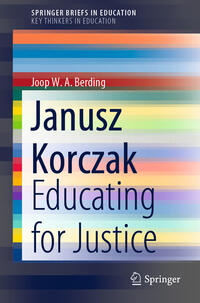
This book presents the educational view and practice of the Polish-Jewish doctor, writer and pedagogue Janusz Korczak (Warsaw 1878–Treblinka 1942). In the authors' reconstruction five core elements stand out: respect for every child; participation; justice; dialogue as expression and communication; self-awareness and reflection on the part of the educator.These elements do not constitute a well-rounded theory or philosophy, but are part of many stories of living together with children, in Korczak’s case orphans. Korczak, actively involving the children themselves, organized this life in such a way that justice ruled. He is the pedagogue of narrativity and of democratic upbringing. Korczak explored many, and today still challenging ways of participative education.The book shows that besides the now domineering positivist outlook on education, with its technocratic language and stress on output, standards, testing, etc., another language is possible, one that is more practice-based and that teachers will relate to immediately: love for children, a pedagogical ethos, and seeking ways to live together in a just way.